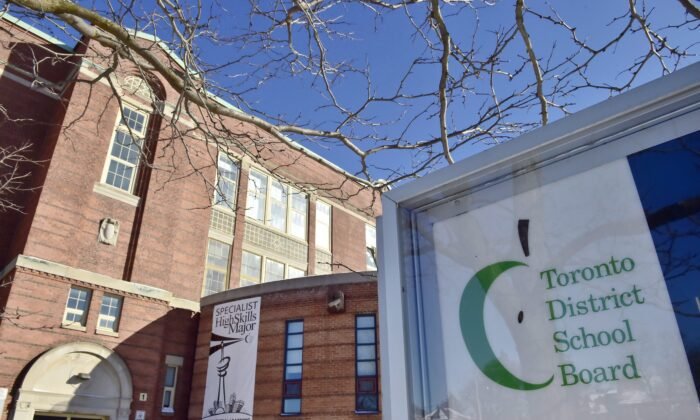Minister Urges Toronto School Board to Reconsider Program Admission Criteria, Advocates for Merit-Based Selection
Ontario’s Education Minister, Stephen Lecce, expressed his concern regarding a new admissions policy for specialized programs implemented by the Toronto District School Board. This updated policy has replaced merit-based admissions with a lottery system.
In a letter dated April 17 to Toronto District School Board (TDSB) chair Rachel Lin, Mr. Lecce stated that he had “serious concerns” about the revised admissions policy. He has instructed the board to reevaluate the changes made in 2022 and to “commence a new, open, and transparent policy review consultation.”
TDSB announced in 2022 that it would be altering the application process for specialized schools, moving away from merit-based assessments to a lottery system.
The rationale given was that the lottery would offer a fairer opportunity for students who may not have access to lessons or tutoring in subjects like music and math to attend specialized school programs.
However, the change raised concerns among parents and students.
“In the weeks leading up to the spring 2022 vote on the new admissions policy, students, parents, and educators raised issues about data omissions and the lack of a transparent consultation process,” Mr. Lecce mentioned in the letter.
The minister emphasized the government’s commitment to a “modern, twenty-first century education system” focused on academic excellence, transparency, and accountability.
“However, the evidence suggests that TDSB is not meeting that expectation,” as stated by the minister.
The letter from Mr. Lecce was shared on social media by Save Our Schools, a group advocating for concerns related to the specialized programs admission policy.
In response to the minister’s letter, TDSB chair, Ms. Lin, informed The Epoch Times that the lottery process had achieved its intended objective.
“The TDSB takes its responsibilities to meet the Ministry of Education’s expectations and the Ontario Human Rights Code seriously,” she added in an email, highlighting the province’s emphasis on removing barriers and promoting diversity.
“To that end, Trustees approved changes to the admissions process for Central Student Interest Programs two years ago. The data now shows that the new process has led to a more representative student population, including more students from working-class families and Black students. This data will be shared with the Board shortly as part of an update on the admission process implementation,” Ms. Lin stated in the email.
Plagiarized Report
Following the introduction of the lottery system, TDSB commissioned a report titled “Literature Review on Meritocratic Perceptions in Public Education and Diverse Learning Opportunities.” The report supported the use of a lottery system for specialized high school admission.
However, concerned parents approached University of Toronto economics professor Marcin Peski to analyze the report’s methodology.
Mr. Peski discovered that the report contained false citations, unattributed quotes, and plagiarized content. He identified approximately 20% of the citations in the report as false and around half of the text as copied from other sources in his analysis.
In February 2024, trustees Weidong Pei and Dennis Hastings proposed a motion to investigate the report during a meeting of the priorities and planning committee. However, the committee rejected the motion in a 7-11 vote.
The motion requested the director to produce a report for the committee detailing the review process for the questionable report and the reason for presenting the paper to trustees without proper review.
Staff informed the committee that the report was authored by a temporary employee who had been terminated.
Ms. Lin inquired about the payment status of the employee for the work, and staff suggested that the answer should be discussed privately.
Mr. Pei opposed the private meeting and emphasized the board’s need to demonstrate accountability to the public.
Mr. Lecce referenced the report in his letter to the board chair, describing it as alarming.
“A report concerning the admissions policy was presented to trustees, prompting public concerns about its credibility. Despite these concerns, the report has not been retracted,” the education minister remarked.
Ms. Lin deemed it “old news,” asserting that the report did not influence trustees’ decision to change the admissions process.
“Regarding the Minister’s remarks about a report shared with the Board on this policy, this is dated information. The report presented a year ago contained 14 appendices. One appendix had information from numerous reputable sources but unfortunately had significant citation errors,” she clarified. “The author of this appendix no longer works with the Board. It is crucial to note that this report had no impact on the Trustee decision to change the admissions process a year earlier.”
Flawed Lottery System
With the new lottery system, TDSB announced that all Indigenous applications and siblings of current students would be accepted for the 2023/24 school year. Moreover, 25% of the remaining spots would be reserved for students who self-identified as racialized, LGBTQ+, or disabled through the lottery.
TDSB stated that any unfilled spots would be allocated using a random selection process.
However, a technical error resulted in a glitch in the process, leading to minorities who were waitlisted being excluded from the lottery draw. To rectify this, TDSB offered 89 additional seats to the overlooked students.
A report based on input from 3,600 community members highlighted the absence of consensus on the use of a lottery system.
Furthermore, the report indicated that many respondents believed there should be some form of merit-based criteria for specialized school programs.





